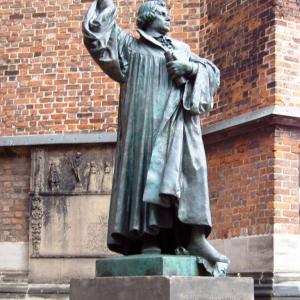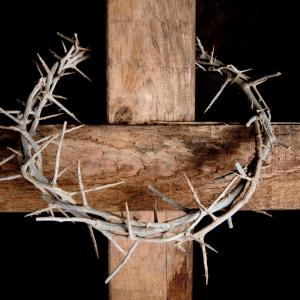Michael Middaugh is pastor of Calvary Lutheran Church in Silver Spring, Md.
Posts By This Author
Created for the Eighth Day
It's no secret that most of us find ourselves longing for chances to vacate our normal scenery and the bustle of our everyday activities. It is, of course, a luxury and blessing of the modern world — and definitely of our country — that many of us have expendable income and time, but the ability and desire to take a break is something most of us would say that we need on occasion.
I think there is a biblical tie-in here as well. One of the spiritual revelations during my seminary years was one professor's focus on the “eighth day.” You are familiar, I am sure with Genesis' seven-day creation narrative. God created the heavens, the earth, animals, and mankind in six days. Then on the seventh day, God rested. This Divine day of rest then became the basis for God's gift of the Sabbath. It was a law (or was it Gospel?) given to God’s people in the book of Exodus, commanding that they break from work on the seventh day of the week — traditionally Saturday for the Jewish people. This day of rest was given so the people could find peace in not working, but also peace in God's presence. For the Jewish nation just released from slavery in Egypt, this day revealed a stark contrast from their lives as slaves — they now lived their lives as a chosen people of God.
This Sabbath tradition continued through the Old Testament and was even adopted by other cultures. But in spite of this gift, God's people never found true peace. Trouble continued, wars waged, life was still not perfect. Then, in the New Testament something happens. The Gospels each build up to, and point us toward, the cross. We see the seven-day passion narrative unfold beginning with the triumphal entry, climaxing in the cross, and then, following the historic tradition, Saturday becoming a day of rest as Christ is in the tomb.
But something changes.
... And Every Tongue Confess
I am part of a liturgically worshiping tradition. There are days I wish I wasn’t; days when our Kyrie is lacking splendor and our Eleison feels redundant; moments that I wish we could get to the important stuff — my inspired and infallible message (I kid) — and toss the unending Psalm or Prayers of the Church.
And then there are the other times, when I am guiltily reminded that cutting the creed means missing out on the same words spoken by millions of believers before me. Or when the music just all works and my heart is stirred by the Hallelu– (shhh, its Lent) Chorus.
So I like to remind my community of believers from time to time why we do what we do. I have long felt the risk of liturgy is that it becomes rote narration, a thoughtless speechifying of sorts. So that this might be avoided, here are my thoughts on the creeds and why a corporate confession of faith is still valuable today.
Reformation Day, God's Word, and Personal Faith
Today is the day we remember the Protestant Reformation. On Oct. 31, 1517 Martin Luther, my denomination’s namesake, nailed his 95 Theses on the church door in Wittenburg. It was the beginning of a new movement that brought many changes to the Christian church. Perhaps the change I am most thankful for (other than a new awareness of justification by faith alone, simul iustus et peccator, and imputed righteousness of course) is that the Reformation paved the way for the Bible to be placed in the hands of the people. Before Luther’s German translation was completed in 1534, which happily coincided with advancements in the printing press, it was virtually impossible for any non-clergy Christians to get ahold of, much less read, the book we take for granted.
Individual faith and the ability to study this book for ourselves is a benefit we don’t even stop to consider. I grew up with more Bibles in my home than we could ever use and have countless different versions now in my office. And yes, there are still some places where access to information and printed text is hard to come by, but at least here, God’s Word is always at our fingertips, if we want it to be.
He Said — Egalitarianism: Who Needs Repentance Anyway?
Editor's note: This is a He Said, She Said on the issue. To read this author's wife's take, go HERE.
My wife and I have been embroiled in a deep debate lately. It involves gender roles, complementarianism, egalitarianism, and often threats of a kick landing somewhere on my body. It’s not that we haven’t worked this sort of thing out within our marriage — I take out the trash, she does the laundry — but somehow despite both being raised in Christian households we do not see theologically quite eye to eye on this issue.
I happen to fall on the side of complementarianism. For me this does not threaten the basic equality or God-given image and sense of worth that belongs to all humankind. But I do happen to think men and women were designed differently biologically and otherwise. Yesterday morning in yoga, I did my downward dog alongside 15 women and one other guy. I work in the same building as a special needs school with 22 female teachers and only one dude. I am happy to say that there are some areas women seem to be drawn toward, and in my opinion, excel in.
My wife on the other hand would like to argue (and does) that to pointing out any differences whatsoever leads necessarily to thinking in terms of an inequality. She believes that many of the Biblical mandates on gender roles have more to do with timing and culture than God-given norms.
Love God, Love Your Neighbor: How Are We Doing?
For the Christian church it should be a constant question. This “greatest commandment” is given by Jesus in Matthew 22, Mark 12, Luke 10 and paraphrased here in John 13.
"A new commandment I give to you, that you love one another: just as I have loved you, you also are to love one another. By this all people will know that you are my disciples, if you have love for one another.”
So how are we doing?
Easter: Not for Religious People
“When religion ruled the world, they called it the Dark Ages.”
That was the bumper sticker quote I read on the tailgate of a white minivan during my morning’s commute to work. Upon reading, I had so many adverse gut-reactions to this statement.
That’s so closed minded. And, Aside from a few erroneous events, don’t you know how much good Christianity has done for the world? And, I am sure you have all the answers to all the world’s problems then don’t you, Mr. White Minivan? (Amusingly, the sticker on the opposite side of the tailgate read “I think, therefore I don’t listen to Rush Limbaugh,” to which I thought, Meh, fair enough.)
Once I worked through my initial feelings of angst though, I reflected on those words a bit more. I realized maybe he has a point. When religion rules, things generally do not go well for the people practicing it, or for those who are being subjected to the religious standards.





